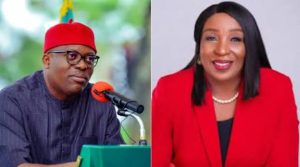
The United States’ recent designation of Nigeria as a “Country of Particular Concern” (CPC) for alleged severe violations of religious freedom has catalysed more than a diplomatic crisis; it has ignited a profound domestic schism.
The ensuing maelstrom of public outrage, cynicism, and debate transcends the specifics of the allegation. It has morphed into a de facto referendum on the competency, integrity, and very legitimacy of the nation’s political elite, revealing a cavernous trust deficit between the governed and the ruling class.
The Nigerian state has advanced a narrative that swiftly rejects the designation as a “fallacy” and an “inconsistency,” blaming it on disgruntled opposition politicians and their foreign lobbyists. This position has failed to gain traction with a significant segment of the populace, who seem to support the designation and even possible military intervention.
Instead of unifying the country against a perceived external slight, the government’s response has been met with a torrent of public critique that indicts the political class for its myopia.
It is obvious that the public’s reaction is not merely about religious freedom but is a proxy for a multitude of grievances against the government. The public is using this external validation of internal failures to articulate a long-suppressed verdict on systemic governance failures.
The focus is on the CPC, but the subtext is rampant insecurity, an economic precarity that has driven 139 million people into poverty, and a political culture perceived as fundamentally self-serving and unaccountable.
This has created a bizarre scenario where public office holders boast openly of their ill-gotten wealth and live ostentatiously like celebrities, all while acting with impunity and using the security and judicial apparatus to suppress dissenters who demand accountability.
Many citizens have drawn direct lines between the government’s inability to protect citizens from religiously-tinged violence by non-state actors and its failure to provide basic public goods. The state’s rebuttal is widely framed not as a defence of national sovereignty, but as a defensive manoeuvre by a ruling class incapable of introspection or substantive reform.
The government’s reaction is further critiqued within foreign policy circles as a catastrophic failure of strategic communication. Rather than presenting a forensic, evidence-based counter-narrative to the U.S. allegations, the initial response was polemical. This approach cedes the discursive arena and confirms the very accusations of intolerance it seeks to rebut.
The president of Nigeria claims that his administration is engaging the international community diplomatically.
Nevertheless, international diplomacy in the 21st century is a complex game of perception management. The current reaction by officials, a dismissive press release, betrays a startling absence of diplomatic strategy and a fundamental misunderstanding of how to engage in the court of global public opinion.
This vacuity is compounded by a reactive and ad-hoc foreign policy framework, one that is ill-equipped to navigate the intricacies of modern international relations, where human rights indices are increasingly tied to strategic partnerships.
The concept of a “referendum” is potent precisely because it captures a moment of collective indictment. The government’s legitimacy rests not only on its legal right to rule but on the perceived consent of the governed.
The overwhelming public sentiment following the CPC designation suggests a significant withdrawal of that consent.
The political class is now faced with a stark choice. It can continue to dismiss both the international community and its own citizens, a path that leads to further isolation and deep-seated internal division.
Alternatively, it can treat this confluence of external pressure and profound loss of public confidence as a critical juncture, one that serves as a catalyst for the deep, structural reforms that have been perpetually deferred by successive administrations.
This would require more than diplomatic manoeuvring. It demands a tangible, demonstrable commitment to ending the impunity of those who orchestrate mass violence, a rigorous overhaul of a security architecture in evident distress, and a genuine project of national reconciliation that resolves the sectarian fissures exploited by political actors for decades.
Ultimately, the CPC designation is an external stimulus. The resounding and resonant reaction of the Nigerian citizenry, however, is an internal awakening. The true “referendum” is not on a single policy but on the foundational contract between the state and its people.
The verdict, as seen in the court of public opinion, is currently a damning one. The question that now remains is whether the country’s political class possesses the acuity to listen, or the political will to act, before the situation becomes an irreversible rupture , especially with the looming threat of military intervention by the United States government.
Augustine Eigbe, PhD is a historian and development communication expert



